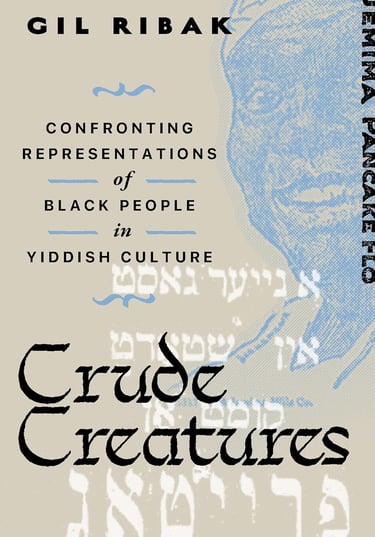Corrects the record on how Yiddish media portrayed African Americans
Understandings of Black-Jewish relations have been notable for the near consensus among scholars that the Yiddish press repeatedly condemned discrimination and prejudice against African Americans, and highlighted the similarities between the situation of Jews in Eastern Europe and Blacks in America. This book argues that this view covers just a sliver of the varied representations of Black women and men. East European Jewish culture during the immigration era was not uniformly supportive of Black Americans as those interpretations suggest.
Crude Creatures draws on a mixture of previously unexplored Yiddish press, theatre, and literature from Eastern Europe and the United States through 1929 to examine how Black Africans and African Americans were depicted. It charts a significant gap between the sincere condemnation of lynching, violence against Black Americans, and racial segregation on the one hand, and the ways in which Jewish authors, newspapers, playwrights, actors, and theater managers actually represented Black people on the other. While most East European Jews would not have seen a Black person before their arrival in America, they had already acquired preconceived imagery of Black people through rabbinic exegesis, pious advice, travel narratives (either original or adapted from other languages), folklore, scientific explorations, pulp literature, press reports, political rhetoric, and educational materials. Thus, Yiddish writers commonly described Black people as cannibals, oversexed, prone to violence, childlike, or just happy-go-lucky people.
Crude Creatures provides a critical revision, correcting the accepted rosy narrative of Black women and men’s portrayals in Yiddish culture, and highlighting what we can learn from these representations about how immigrant groups integrated their own cultures into American racial hierarchy and vocabulary.


Editorial Reviews
"An extension of Ribak’s earlier work on Jewish relations with other European immigrant/ethnic groups, Crude Creatures is a significant and courageous work that shines critical, revisionist light on a master narrative in American Jewish history." ~John J. Bukowczyk, Professor Emeritus of History, Wayne State University
"The depiction of African Americans and Black Africans in Yiddish literature and culture has been much discussed but greatly misunderstood. Gil Ribak complicates a frequently oversimplified body of commentary that tends to congratulate Yiddish writers and artists for their sympathetic treatment of Black people while overlooking less salutary aspects of this story. Ribak’s broad and deep research on such depictions in the Yiddish press, theater, literature, and other areas of Yiddish culture paints a complex and ambivalent picture of one minority people’s treatment of another. The result makes for sometimes uncomfortable but always illuminating reading, of a story told with remarkable erudition and great flair." ~Joel Berkowitz, University of Wisconsin-Milwaukee
"In this unvarnished, often troubling study, Gil Ribak reveals the degree to which negative—and often starkly racist images and perceptions of African Americans penetrated the Yiddish-language culture of Jewish immigrants in the United States during the early decades of the twentieth century. Revising a standard account that emphasizes Yiddish writers’ empathy and identification with African Americans, Ribak paints a more complex picture, one that exposes the ambivalence and contradictions of acculturation and underscores the sway that America’s racial culture held over European immigrants, even during their first years on these shores." ~Eric L. Goldstein, author of The Price of Whiteness: Jews, Race, and American Identity
Contact
Reach out for questions or collaborations
+1-520-626-5788
© 2025. All rights reserved.